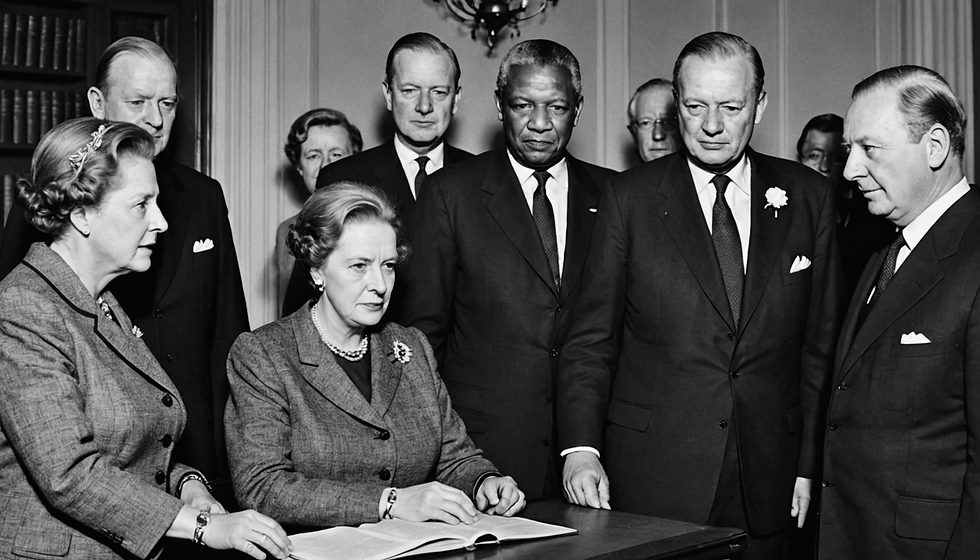Soft & referent power: An invitation to the "Circle of Value"
- R.M. Boylan

- Feb 28
- 5 min read
R.M. Boylan, BSc. M.A.
Pleasant surprises can soften hostilities for negotiations.

Negotiation stage setting: Unexpected surprises
I aimed to highlight a best practice used by a nation in negotiations. It was straightforward but full of hope and aimed to establish a foundation for a fruitful alliance. Its simplicity makes it a tactic accessible to everyone. However, it has significant implications as conflicts intensify worldwide.
This approach provided a graceful and dignified method of addressing perceived or real conflicts before they become intractable. Additionally, it can set an example of desirable behavior for leaders. When doing gestures of kindness it is important to evaluate who you are doing it for and whether it could potentially backfire.
This article reviews current conflicts we are seeing and how soft power can be used to neutralize hostilities. The use of hard power in many circumstances escalates conflict and erodes trust.
Referent power
Referent power is the ability to attract others and build loyalty through personal qualities, interpersonal sensitivity and relationships. Prime Minister Sir Keir Starmer used his trip to the White House to present Mr. Trump with a personally delivered invitation letter from King Charles. The timing of doing so was well orchestrated. In this example for understanding the negotiation process we see the use of soft power rather than hard power to achieve a desired objective. Both sides have only to gain by partnering. Crafting a way to set the stage for positive negotiations must be done carefully.
Exquisite deployment of referent power
In negotiations or to get to the negotiation table strategies can be used to leverage referent power with soft power tactics. In other words, remove all ego-based posturing and present a welcomed surprise, something unexpected. The invitation would reinforce and personify the importance of their partnership.
In this situation where international conflict and hostilities are increasing, referent power was exquisitely deployed. I am highlighting this as a best practice where insights may be gained. Even if you are not a King or a Queen, a hand written note with a special surprise that is immaterial can set the stage for disharming an otherwise volatile and unpleasant conflict.
A pleasant and unexpected invitation achieved the following:
1). Built rapport: Neutralize previous disagreements and issues.
2). Demonstrated benevolence and tenderness towards the other party.
3). Modeled desired behavior: Leaders need to set examples to their followers, their superiors and their peers. Displaying benevolence where aggression could be justified raised the power the British had to an immaterial level. By handling the situation with composure, respect and benevolence, Mr. Trump mirrored back the desired behaviour naturally.
4). Appealed to self-interests.
5). Created a sense of importance.
6). Established boundaries.
Presenting the value of our relationship in a pleasing & nostalgic way
Sir Keir said the president's last state visit in 2019 had been a "tremendous success" and that the invite for a second visit was "truly historic" and "unprecedented". Traditionally second-term US presidents are not offered a state visit and have instead been invited for tea or lunch with the monarch at Windsor Castle.
King Charles' letter proposed a meeting to discuss details of the state visit at either Dumfries House or Balmoral, both in Scotland, a country to which Trump has connections. The letter, which Trump showed to the cameras, read:
Trust as a currency for good negotiations
"Quite apart from this presenting an opportunity to discuss a wide range of issues of mutual interest, it would also offer a valuable chance to plan a historic second state visit to the United Kingdom. As you will know this is unprecedented by a US president. That is why I would find it helpful for us to be able to discuss, together, a range of options for location and programme content.
In so doing, working together, I know we will further enhance the special relationship between our two countries of which we are both so proud." Pressed over whether he would approve the UK's potential deal to hand over the Chagos Islands to Mauritius, Trump said: "We're going to have some discussions about that very soon, and I have a feeling it's going to work out very well. I think we'll be inclined to go along with your country."
Reframing "enemy images" in a positive light for negotiations
In this situation, we see a more favorable approach to easing other more aggressive negotiation stance. In leadership and negotiations involving volatile and potentially intractable conflicts, the use of power forms can either establish or damage a relationship. Leveraging insight, self-awareness on the point-of-view of the other and how to delight them can transform negativity into hope. This sets the stage for a shared alliance and partnership.
Power forms/combinations 2 approaches: Leadership & negotiations
Approach 1: Positional, coercive, authoritative power "55%"
The maximum power achievable through coercive power (10%), positional power (20%), and authoritative power (25%) totals approximately 55%.
Approach 2: Authoritative, referent, positional, reward power "75%".
In this example, the UK Prime Minister Mr. Starmer adopted a more productive and benevolent approach to ease tensions with the new U.S. President. This is crucial for transforming an apparently stubborn conflict into a cooperative and amicable dialogue for future negotiations.
King Charles used diplomacy. The invitation & eliciting the tradition of it evoked nostalgia to craft a captivating invitation for Mr. Trump. This strategy blended referent power as an influence method, creating an invitation to the "Circle of Value" for trade-offs, concessions, and partnerships.
The U.K. approach integrated authoritative power at 25%, referent power at 20%, positional power at 20%, and reward power at 10%. The total power displayed in this strategy without coercive power, authoritarianism and retaliation resulted in a total power of 75%. Mr. Trump was pleasantly surprised and brought into the "Circle of Value" for negotiations and partnership discussions.
The power dynamic completely transformed from confrontation to joy and gentleness. While the threat is still considerable, it was alleviated by employing soft power rather than coercive power. This sets the stage for creating the "Circle of Value" for fruitful and mutually beneficial alliances.
References
Boylan, R.M. (2006-2009). Conflicts and considerations comparing Abraham Maslow's hierarchy of needs to Jane Loevinger's model of ego development for assessing the level of development of a leader. M.A. Leadership Studies.
Rosenberg, M. B. (2003). Nonviolent Communication: A Language of Life. PuddleDancer Press.
Fisher, R., Ury, W. L., & Patton, B. (2011). Getting to Yes: Negotiating Agreement Without Giving In. Penguin Books.
Deutsch, M. (1973). The Resolution of Conflict: Constructive and Destructive Processes. Yale University Press.
Boylan, R.M. (2023) The Shadow Psyche in Leadership & Decision- Making: A Praxeology Perspective on the Collective Unconscious Psyche. Neurology & Neuroscience. 10.33425/2692-7918.1053 https://www.sciencexcel.com/article/shadow-psyche-leadership-decision-making-praxeology-perspective-collective-unconscious-psyche





Comments